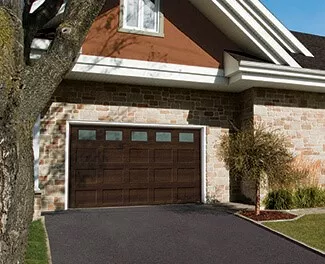Garage door myths: Separating fact from fiction
The Internet has been a blessing to humanity in many ways. However, it has also allowed misinformation and untruths to spread like wildfire. It’s very easy for someone to make claims that sound true but are, in fact, lies. Those spread very quickly because few people bother to take the time to verify what they share online. While this might be most visible in areas such as politics, it also applies to others, including garage doors.

If you’re shopping around for a new garage door, it’s important that you are able to separate fact from fiction. Don’t fall victim to garage door myths that persist online or that get repeated from person to person. We’re here to dispel those and help shed some light on the reality.
Garage doors are all the same
This is one of the simplest myths to debunk. Garage doors are most definitely not all the same. Just look at the wide range of construction material options out there! You can choose wood, aluminum, steel, or even glass if you really want to. Each of these materials has its own benefits and drawbacks. For instance, wood is natural and warm. Steel is strong and durable. Aluminum is light and modern. Glass is elegant and modern. You just need to choose which material suits your needs and goals best.
You also need to consider door thickness. For instance, if you have a double garage door that measures 16 feet by 7 feet, it should really be 1‑3/4 inches thick and injected with polyurethane foam. Why, though? It helps ensure that the door is sold, strong, and able to protect your belongings, even on days when you leave the door open for long periods.
You shouldn’t insulate a garage door
It is easy to see how this particular myth got started. After all, a door’s only real purpose is to close an opening, right? What’s the point of insulating it? And we’ll agree – if your garage is located in the backyard and all you do is use that space to store low‑value items, then insulation really doesn’t make much difference. However, this is not the case for most of us.
If your garage is attached to the home, or you use it to store anything that’s more valuable than spare reams of printer paper, then insulation plays a significant role. For instance, because your garage is attached to your home, the temperature variance between the two will affect your home’s interior temperature. Insulation on the garage door helps mitigate that impact.

If there’s a bedroom over the garage, it makes a lot of sense to install a weathertight, insulated garage door, as well. Insulating a garage door can help to reduce your energy usage and your utility bills, and will also help to protect valuable items stored in your garage from temperature fluctuations throughout the year.
You can repair your garage door on your own
We do not recommend repairing serious issues on your garage door by yourself, particularly the spring systems. A mistake here can cause serious injury or even death. With that being said, there are things you can do on your own to maintain the garage door so that repairs are less likely to be needed. You’ll want to conduct a visual inspection of the door twice per year. Tighten all nuts and bolts on the door itself. Lubricate metal parts, as well as the weatherstripping. However, if you have more complex maintenance or repair needs, get in touch with us at Atlantic Windoor.
Garage doors don’t require maintenance
This one is patently false, and we have no idea how it might have gotten started. Like most other systems in your home, your garage door DOES require regular maintenance. Again, we recommend that you conduct maintenance twice per year – more often if you use the door frequently. 70% of homeowners in North America use their garage door as the primary entry point to their home. It makes sense that you would want to ensure that it was in good shape and safe to use. Not sure what sort of maintenance you need? Refer to this for your garage door care and maintenance needs.
Garage doors make lots of noise normally
Sure, some garage doors do make more noise than others. And, because many of the components of your garage door are metal, it seems normal that just about any door would make a lot of racket opening and closing. However, understand that there are normal sounds and abnormal ones, and you need to listen for the difference. You should be able to tell the difference between sounds from the opener, and noise caused by poorly maintained rollers, tracks, and springs. If you think your door is making more noise than usual but are not sure what to do about it or where the noise is coming from, contact us.

Garage doors are not really dangerous
This myth probably got started because someone opened a correctly balanced garage door and realized it only weighed about 10 pounds. What harm could that door do to anyone? Even a child could lift it. Here’s the thing, your garage door is actually very dangers. According to the US National Electronic Injury Surveillance System, the US sees 10,000 garage door‑related accidents every single year. These involve cuts, being hit by the door, crushed fingers, broken bones, and more.
In particular, you need to make sure that your garage door’s two automatic reverse systems are in good working condition. These should be checked at least twice per year, but we won’t say anything if you do it more often. To check the mechanical reverse system, place a 2 x 4 on the ground under the garage door and press the close button. The door should reverse the instant it connects with the lumber. If not, there’s a serious problem.
To check the photoelectric reversal system, begin with the door open. Press the button to close it, and then move your foot through the beam emitted from the photo‑eyes located about four inches above the floor. When you break the beam, the door should reverse. If not, there’s a problem that needs professional solutions. Get in touch with us to help.
Repairs are too expensive
Yes, garage door repair bills can often seem high, particularly if you are not really sure what was done to remedy the issue. You can do a few things to avoid costly repairs, though.
First, make sure you conduct garage door maintenance two times per year. You’ll reduce wear and tear, and help prevent failure of components. If you can’t perform maintenance yourself, we’re happy to offer a tune‑up program to keep your door in top shape.
Second, make sure you get a quote and a full explanation of the work being done and the charges you’ll incur before giving the repair person the green light. Make sure that you always confirm the amount of repair while the technician is at your home. If they do not want to give you a clear picture of what’s being done and how much it will cost beforehand, find a more reputable repair provider.
Cheaper openers are just as good as expensive ones
Why should you pay up to $200 more for a garage door opener from a specialist when you can get one at a big box store for so much less? Aren’t all garage door openers really the same, anyway? No, they’re not.
How often do you use your garage door on a daily basis? For most people, it’s around four times. How important is safety to you? Both of these questions bear on your purchase decision.
One factor that reduces garage door opener cost but increases weakness is a three‑part trolley. These are weaker and require a lot more maintenance in order to operate safely when compared to what you’ll get when you work with a garage door specialist. Other issues include:
- You probably only get a single switch, rather than a wall unit that allows you to reprogram your remote.
- You probably lack any sort of accessories, such as smartphone operability or battery backup.
Want to be better informed?
We live in the Information Age, although it would probably be better termed the Misinformation Age. If you want to be in the know and are located in Saint John, contact us at 1-888-451-4040 to learn the reality behind other garage door myths.








Add new comment